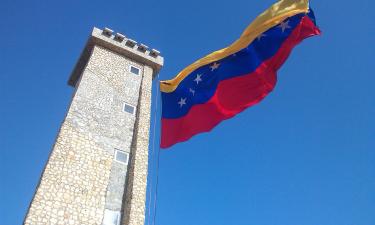The Iraq prisoner abuse scandal widens
 The Russian s have a saying that a fish rots from the head down. American s have a saying where there is smoke, there is fire.
The Russian s have a saying that a fish rots from the head down. American s have a saying where there is smoke, there is fire.
Both these expressions are becoming applicable to the Iraq prisoner abuse scandal as new details emerge and spell out only one thing: cover-up. And, what makes it all worse is that PFC England just might be telling the truth.
I sat watching the ABC Newswire yesterday, and I will be quoting from them extensively in this article. My sincere thanks to ABC News.
Sgt. Samuel Provance, was a member of the 302nd Military Intelligence Battalion stationed at Abu Ghraib. Despite orders from his commander to keep silent, SGT Provance refuses to and spoke with ABC News. SGT Provance said in this interview "There's definitely a cover-up" (of the prisoner abuse).
In the feature article that appeared, SGT Provance said that while he did not see the actual abuse take place, the interrogators with whom he worked freely admitted they directed the MPs' rough treatment of prisoners.
"Anything [the MPs] were to do legally or otherwise, they were to take those commands from the interrogators," he said.
Top military officials have claimed the abuse seen in the photos at Abu Ghraib was limited to a few MPs, but Provance says the sexual humiliation of prisoners began as a technique ordered by the interrogators from military intelligence.
A witness who told ABCNEWS he believed the military was covering up the extent of abuse at Iraq's Abu Ghraib prison was today stripped of his security clearance and told he may face prosecution because his comments were "not in the national interest."
Sgt. Samuel Provance said in addition to his revoked security clearance, he was transferred to a different platoon, and his record was officially "flagged," meaning he cannot be promoted or given any awards or honors.
Maj. Gen. George Fay, the Army's deputy chief of staff for intelligence, was assigned by the Pentagon to investigate the role of military intelligence in the abuse at the Iraq prison.
Fay started his probe on April 23, but Provance said when Fay interviewed him, the general seemed interested only in the military police, not the interrogators, and seemed to discourage him from testifying.
Prison guard Spc. Jeremy Sivits, the soldier who is believed to have taken photos of the alleged abuse of Iraqi prisoners at the Abu Ghraib detention center in Iraq says his fellow troops did much more than sexually humiliate the detainees, according to a copy of his statement obtained by ABCNEWS.
In parts of his statement, Sivits focused on the actions of Military Police Cpl. Charles A. Graner, who he said beat a prisoner who had bullet wounds in his legs while the prisoner was handcuffed to a bed.
During another incident, Sivits said Graner beat a prisoner after he forced him to strip and put a sandbag over his head.
"At one point, after a couple of the detainees were stripped, and I do not know what provoked Graner, but Graner knelt down to one of the detainees that was nude and had a sandbag over his head," Sivits said. "Graner put the detainee's head into a cradle position with Graner's arm, and Graner punched the detainee with a lot of force, in the temple. Graner punched the detainee with a closed fist so hard in the temple that it knocked the detainee unconscious."
Sivits also described an incident where he said detainees were piled in the middle of the prison floor and one accused soldier, Sgt. Javal S. Davis, ran across the room and jumped on the pile. He said Davis repeated the action three times.
"A couple of the detainees kind of made an 'Ah' sound, as if this hurt them or caused them some type of pain when Davis would land on them," Sivits said. "After Davis had done this, Davis then stomped [sic] on either the fingers or toes of the detainees. When he stomped [sic] the detainees, they were in pain, because the detainee would scream loudly."
Sivits also described how Sgt. Ivan L. "Chip" Frederick II participated in the beatings and forced naked detainees to masturbate.
Sgt. Javal S. Davis, one of four former Abu Ghraib prison soldiers who are scheduled tobe court-martialed next week, said any physical actions he took with Iraqi detainees were at the direct instructions of the interrogation officers at the Baghdad prison.
The 26-year-old soldier, who is originally from Roselle, N.J., said he was doing his job and simply following orders.
SGT Davis told Army investigators he was "made to do various things that I would question morally."
"You pretty much do what they do and that's what the instructions were rough them up but don't hurt anybody," Davis said.
The UCMJ Uniform Code of Military Justice specifically provides that a soldier may refuse an order that is illegal. The simply following orders were the excuse many Nazi SS and Gestapo used at the Nuremburg trials and the court overruled that excuse.
In another ABC article Former Army Interrogator trainees say they were taught to get around the Geneva Conventions.
Rafael and Margaret Chaiken, said instructors at Fort Huachuca in Arizona taught them ways to get around the rules.
"They cite examples of ways to bend the Geneva Convention," said Margaret Chaiken, 26, "bend the rules in order to get the information that they need."
The Chaikens trained to be interrogators at Fort Huachuca from July to October of 2003. They say the actions depicted in the pictures of U.S. soldiers humiliating Iraqi detainees are a classic technique they were taught in order "to break a prisoner, and cause them to talk."
These techniques included "putting them in humiliating positions, stress positions, sleep deprivation," said Mrs Chaiken.
In an effort to deflect blame and to do damage control, senior commanders invited reporters inside Fort Huachuca where interrogators get about 700 hours of training to see what a good job the military does. "We train soldiers to do what's right. Our Army is values-based," said Gen. James A. Marks.
The Chaikens describe a different story. "One of the instructors showed how you can make them get down on knees in a certain way that, like, it hurts him," said Rafael. "And that he demonstrated in front of the class actually."
Even the need for a medical IV can be used to interrogators' advantage, they said "Sometimes it takes them three or four times to poke you till they put the needle into the vein. Well, it can also take 12 times," said Mr. Chaiken, 28. "It's not very pleasant, and you're not breaking the Geneva Convention, and you might get some information out of him."
Because honor is very important in the Islamic culture, it is culturally offensive for the Iraqi men to have been naked in front of a woman guard, as was shown in some of the pictures from the Abu Ghraib prison. Mrs. Chaiken said they were taught this is called "P and E Down," or pride and ego down.
"And if you ask the military police to do it that more harsh way, the military police will do it in a more harsh way," said Mr. Chaiken.
In addition, Professor Charles Smith who taught classes on Arab culture at Fort Huachuca said he discovered a shocking racism among some instructors.
"[One sergeant] was quite belligerent and referred to Arabs as 'sandniggers' and I thought that was quite offensive," said the university professor of Near Eastern Studies at the University of Arizona. He no longer teaches classes at Fort Huachuca he left out of protest.
In Another ABC article Lawyers from the military's Judge Advocate General's Corps, or JAG, had been urging Pentagon officials to ensure protection for prisoners for two years before the abuses at Iraq's Abu Ghraib prison came to light, current and former JAG officers told ABCNEWS.
As the military's uniformed lawyers, JAG officers are in charge of instructing military commanders on how to adhere to domestic and international rules regarding the treatment of detainees.
Under condition of anonymity, one current JAG officer told ABCNEWS that for the last two years, "the military lawyers have always been the ones speaking for greater protections and recognitions of rights for detainees and the political appointees have argued for no recognition of rights and careful control of the process.
"If we 'we' being the uniformed lawyers had been listened to, and what we said put into practice, then these abuses would not have occurred," said Rear Admiral Don Guter (ret.), the Navy Judge Advocate General from 2000 to 2002.
Matters got so frustrating that in May and October 2003, eight senior JAG officers took the rare step of going outside the chain of command to meet secretly with the New York City Bar Association, warning of a "disaster waiting to happen".
"They felt that there had been a conscious effort to create an atmosphere of legal ambiguity surrounding these detention facilities, and that it had been done to give interrogators the broadest possible latitude in their conduct of operations," Scott Horton, former chair of the New York City Bar Association's Committee on International Human Rights, told ABCNEWS. Horton's meeting with the JAG officers was first reported by Salon.com.
"When you say something down the chain of command like, 'The Geneva Conventions don't apply,' that sets the stage for the kind of chaos that we've seen," said Rear Admiral John Hutson (ret.), who was the Navy Judge Advocate General from 1997 to 2000.
Rep. Steve Buyer, (R-Ind.), a JAG in the Army Reserves, wanted to offer his services in Iraq. But even though the Army wanted him there, Pentagon political appointees vetoed him going. Buyer told ABCNEWS' John Cochran that he tried to convey to his Pentagon civilian contact how important it was to ensure against the abuse of Iraqi prisoners and detainees, telling him: "You have to get somebody that's qualified in international law and the Geneva Conventions to serve in that brigade I'm pretty shocked that this never happened."
A prisoner died while in American custody at the detention center. Nadem Sadoon Hatab, died last June after a three-day period in which he was allegedly subjected to beatings and karate kicks to the chest and left to die naked in his own feces.
The Marines who are accused said they were given orders to "soften up" the men in their custody for interrogation by what were known as human exploitation teams from military intelligence.
"He was covered in sweat and feces. It was a little hard to get a grip on him so he was moved by essentially hauling him backward by his jaw, kind of holding him onto his lower jar and upper part of his head," said Jane Siegel, attorney for the former officer in charge at Camp White Horse, against whom charges have been dismissed.
A fact finding reveals none of the Marines spoke Arabic, nor were there any translators assigned to the camp.
According to testimony in the case, Hatab was targeted for especially harsh treatment because he was believed to be in possession of Jessica Lynch's, 507th Army Battalion, weapon and suspected of involvement in the ambush of her unit.
(PFC Jessica Lynch was a vehicle driver in a convoy that was attacked by opposition forces and PFC Lynch had been taken prisoner. Her story made headlines when an Army unit broke into the hospital she was in and brought her to freedom.)
Don Rehkopf, an attorney for one of the accused reservists has said, "There was a failure in the senior command leadership. I'm not talking about the command at the Marine Corps level, I'm talking the DOD [Department of Defense] level".
There have been more than a dozen such suspicious deaths of Iraqi prisoners while in American custody.
Secretary Donald Rumsfeld is scheduled to be questioned by a committee on Capitol Hill, but it is unlikely that the committee will find fault considering this is an election year. It would look very bad for the Bush reelection campaign if the committee found a cover up and misdeeds under his administration. As we found under the Nixon administration, a president has the power to turn the IRS loose on a person, and make their life a living hell. A dagger will be pointed at each committee member s throat.
While it maybe laughable, Bush was quoted as saying "Our enemies are innovative and resourceful, and so are we," Bush said. "They never stop thinking about new ways to harm our country and our people, and neither do we."
Perhaps this is an omen more than anything else.
Subscribe to Pravda.Ru Telegram channel, Facebook, RSS!



